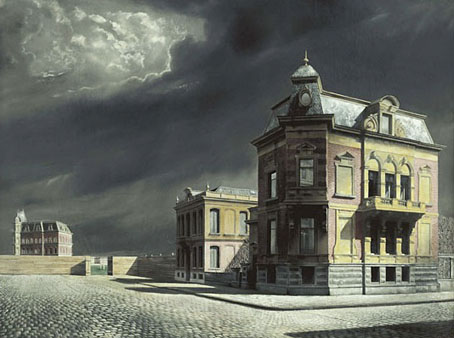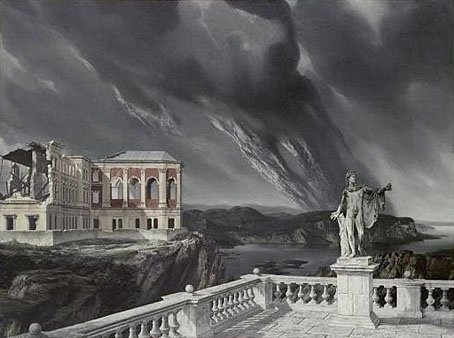Townscape (1934).
Carel Willink was a Dutch painter whose self-described brand of “imaginary realism” conjured in its early years a collection of views of desolate plazas, empty lanes and abandoned ruins over which smoke or cloud hangs like an ominous portent. The works of Giorgio de Chirico and Paul Delvaux come to mind when looking at these pictures although Willink’s work has enough unique qualities to stand apart from his more famous contemporaries. I’m also reminded a little of Spanish artist Arnau Alemany who has a similar predilection for isolated architecture.
Chateau in Spain (1939).
There’s an official Willink website here, while further paintings can be seen at this Flickr set and also at Ten Dreams.
Elsewhere on { feuilleton }
• The fantastic art archive
Previously on { feuilleton }
• Bruges-la-Morte
• Taxandria, or Raoul Servais meets Paul Delvaux
• The art of Arnau Alemany



Nice ‘Twilight Zone’-like imagery. These somewhat remind me of the book the ‘Purple Cloud’ by M P Shiel, though its been years since I’ve read it. If a musician looking for inspiration found themselves walking across these forsaken places, the next pieces they would compose might sound something like John Carpenter or Ennico Morricone.
Really nice work. The first picture seems to be an homage to Khnopff’s ‘Ville Abandonnée’, and there’s one in the flickr set which references ‘The Pink House’ by Degouve de Nuncques. Fascinating to see another interpretation of these themes with an an added shot of Delvaux. Beyond that, there’s an obvious Flemish influence and even things that make me think of Weimar Republic painters. It’s great to find an artist who can combine all this material so effortlessly without being derivative, and render them with such an expert technique. I must investigate further!
Thank you, Dave C for mentioning Khnopff ! I thought about this precise picture without being able to remember its name.
Willink’s work reminds me of some drawings by François Schuiten, perhaps this one : http://www.ruesouveraine.com/photos/uncategorized/maison_autrique.jpg
Dave C & Piotr: I was also reminded of that Khnopff drawing which is featured in my earlier post about Bruges-la-Morte.
There seems to be a profusion of this kind of quiet, mysterious imagery in the Benelux countries, you find it in the Symbolist artists of the region (Dave C mentioned de Nuncques but there’s also Léon Spilliaert’s sombre views of Ostend), the Surrealists (Magritte as well as Delvaux) through to various BD artists like the great Schuiten. Georges Rodenbach’s novel is probably the literary equivalent. Maybe it’s a localised combination of temperament, climate, architecture (empty town squares have a peculiar melancholy) and all those canals; still water invites a kind of contemplation you don’t get from rivers.
Thanks ! I hadn’t read this insightful post about Bruges-la-Morte when I wrote my previous message.
I really love your journal which I discovered a few years ago while searching about F-X Messerschmidt. I’m french, so if you ever need help with translating something (Jullian, etc.), don’t hesitate !
(Sorry for the off-topic.)
Thanks, Piotr, I’ll bear that in mind.
thank you for the introduction to this artist-brilliant.
Images of loneliness.